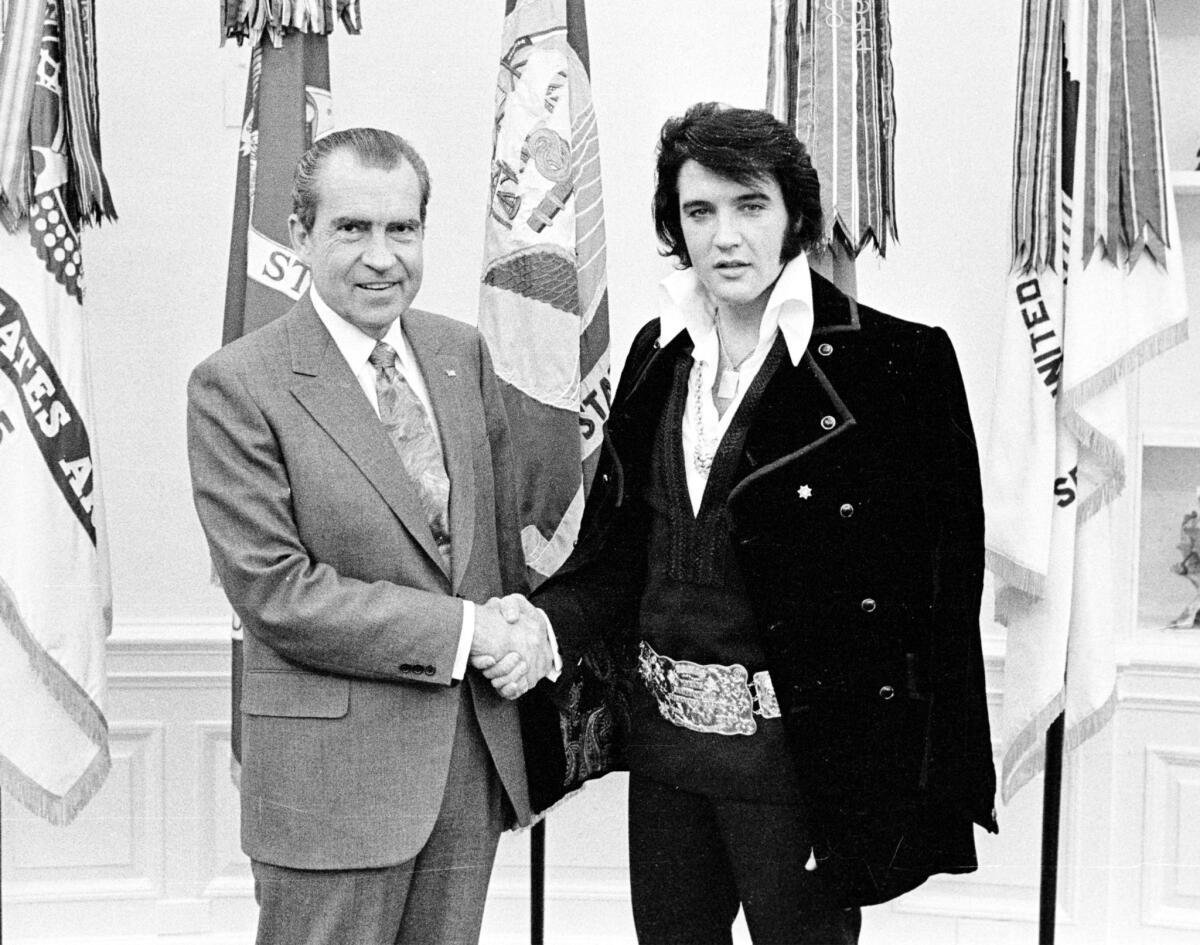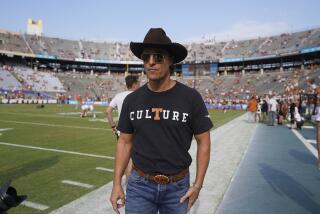Inside the moment when Elvis Presley met Richard Nixon

President Nixon’s meeting with Elvis Presley on Dec. 21, 1970, at the White House is the inspiration for the film “Elvis & Nixon.”
- Share via
It is one of the most unlikely images in existence. Two men of extreme power and influence, yet from completely different realms, one a politician and the other an entertainer. It is the kitschy incongruity of their appearance and body language, one stiff in a businessman’s suit and the other relaxed in a velvet cape, that makes Richard Nixon and Elvis Presley shaking hands in the Oval Office on Dec. 21, 1970 an object of ongoing fascination. It is said to be the most requested photo in the National Archives.
Nixon would not begin taping Oval Office conversations until a few months later, so what was said between them is left to speculation and the recollections of the few people who were there. The new film “Elvis & Nixon” imagines their meeting as it presents just how Elvis (Michael Shannon) got into the Oval Office with Nixon (Kevin Spacey) on that day. The supporting cast includes Alex Pettyfer as Presley’s friend Jerry Schilling, along with Colin Hanks, Johnny Knoxville, Tracy Letts, Tate Donovan and Sky Ferreira.
Directed by Liza Johnson from a screenplay credited to Joey Sagal, Hanala Sagal and “The Princess Bride” star Cary Elwes, the film stakes out a specific tone that is fun without making fun of the towering historical figures at its center.
See more of Entertainment’s top stories on Facebook >>
Schilling really was there that day. He was living in Los Angeles and establishing his own career as a film editor when he got a phone call from Presley asking to pick him up at the airport. Soon Schilling would be accompanying Presley to Washington for the singer’s scheme to become a credentialed federal agent at large, as the singer personally delivered a handwritten letter to a White House gate at 6:30 a.m. and was meeting the president by early afternoon.
“At the time it seemed normal to me,” Schilling said, “but I guess it’s a pretty bizarre meeting.”
Schilling met Presley in Memphis in 1954 playing pickup football, when Schilling was 12 and Presley 19. He was there for Presley’s wedding and was a pallbearer at his funeral. Schilling still lives in the house above the Sunset Strip that Presley bought for him in 1974.
“I’ll tell you what was big about this for me,” Schilling said of the trip to Washington during a recent interview in his home. “When Elvis decided to do something on his own ... I was the guy he trusted to do it with him.”
Schilling published his own memoir of his friendship with Presley in 2006, titled “Me and a Guy Named Elvis.” He is credited as an executive producer on “Elvis & Nixon,” though Johnson referred to him as the “North Star” during production.
In a recent phone interview from her home in Brooklyn, Johnson said the warm tone of the script was part of the appeal to her.
“Nobody really wants to see a big takedown of Elvis Presley,” Johnson said. “And nobody needs to see a big takedown of Richard Nixon because that happened already.
“To me what was interesting was the way the script acknowledged the kind of comedy of the situation of these men of radically different styles encountering each other in the space of their own fame and their own power. At the same time, it isn’t at their expense. I think it is possible to think about these figures and consider them, but it doesn’t have to be about making fun of them.”
Though Presley has been played by a wide range of actors over the years, including Kurt Russell, Don Johnson, Val Kilmer, Jack White and Bruce Campbell, Shannon makes the part seem fresh.
“It was probably the most fun I’ve had making a movie in a long time,” Shannon said.
Shannon is known for intense performances such as in his recent roles as a real estate hustler in “99 Homes” or a troubled father in “Midnight Special,” and he is on Broadway in “Long Day’s Journey Into Night.” Yet he brings a depth, humanity and soulful quality to his portrayal of Elvis.
Shannon’s Elvis voice isn’t the burbling baritone of countless lounge-act Elvis impersonators but rather something reedier and softer, with a shy charm and sly confidence.
“It’s a much more conversational voice,” said Shannon. “It’s more like Elvis just talking to a couple of guys. It’s not performative, it’s not his public persona. It’s how it would be if you were walking up to him.”
“Do Elvis’ voice and Michael’s voice sound alike? No,” said Schilling, who gave Shannon an audio recording of a 42-minute interview he did with Presley for the 1972 documentary “Elvis on Tour.” Schilling said that only one snippet from the interview is used in the movie and it has otherwise been unheard all these years. “But I would rather have a great actor portraying Elvis in this movie than one that may look more like him or sound more like him. There are actors who play the outer Elvis and actors who play the inner Elvis. And the inner Elvis is really rare.”
In preparing for the film, Shannon and Schilling went to Memphis. And though they made the expected visit to Presley’s Graceland estate, it was seeing the modest public housing development known as the Lauderdale Courts where the Presley family lived for a few years before Elvis was famous that really touched Shannon.
“I think you learn about people when you see where they come for,” said Shannon. “I saw him in his bedroom, a tiny bedroom, barely big enough for the bed. There’s this window looking out at this bleak landscape and I just imagined Elvis sitting on that bed looking out the window, wondering what his life was going to be like.”
Two scenes in the movie, one of Elvis talking to Schilling and another alone before meeting Nixon, give an unexpected insight into Presley’s self-regard, what Elvis thought about Elvis. “I become an object,” he says of his adoring fans. “They never see me.”
“He’s so iconic, there is really no one else that famous ever,” said Liza Johnson. “And it’s actually uncommon that people ask themselves about his interior life. You see him on a postage stamp or you think about things you already know about Elvis and it’s uncommon to think, what did Elvis want out of this situation?”
That day in the Oval Office isn’t even Schilling’s most memorable moment with Elvis — he was there when Elvis met the Beatles too — but Schilling is grateful for the care and respect the production of “Elvis & Nixon” gave to his friend, allowing him to be a person and not a thing.
“They didn’t have to listen to me, but they did,” Schilling said. “It’s a project for everybody else — it’s my life.”
Twitter: @IndieFocus
More to Read
Only good movies
Get the Indie Focus newsletter, Mark Olsen's weekly guide to the world of cinema.
You may occasionally receive promotional content from the Los Angeles Times.











